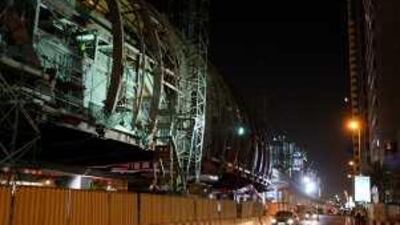DUBAI // Retail outlets on the Dubai Metro will benefit from a captive market of a million consumers every day, but retailers wonder whether the commuters will have the spending power to sustain them. The Dubai Metro which is scheduled to open this year, is expected to have more than 11,000 square metres of retail space, Dubai Metro officials said at a presentation to businesses in Dubai yesterday. "Imagine how the Dubai Metro will redefine the retail business in Dubai," said Abdul Mohsen Ibrahim, the chief executive of the Roads and Transport Authority's (RTA) strategy and corporate governance department. Food and beverage outlets, general and convenience stores as well as property showrooms will take up most of the retail units. Up to 27,000 passengers an hour were expected to shop as they travelled on the system, said Raymond Lau, the country manager for the Middle East with MTR, Hong Kong's mass transit operator, which is acting as a consultant on the Dubai Metro project. Sales in the metro could prove more resilient in the downturn than in malls, he added. "This is one of the benefits that you get, rather than in a shopping mall," said Mr Lau. He said Hong Kong, which also has a strong retail component along its rail network, recorded robust shopping figures during November and last month - a time when conventional shopping outlets were suffering a downturn. Some retailers in Dubai remain sceptical, however, as anecdotal evidence suggests shoppers have become more careful with their cash and that sales in malls and shops have fallen in recent months. Businesses fear commuters may also bypass metro stores, particularly those people whose income obliges them to use public transport. "There could be people who cannot afford the products being sold on the Metro," said Gaurav Narain, the manager of business development for Unipex Dairy Products, which includes London Dairy. "It all depends on what each [train] ticket is priced at, which we don't know." Wahid Albayad, the executive manager of Dubai Gate Trading, said he was afraid 70 per cent of passengers would be rushing to or from work and would not stop to shop. Still, he aims to open souvenir shops along the line because of its distinctive location. "We're looking to open new lines of business, especially when all other business is going down," he said. Robert Ziegler, the director of the research firm AT Kearney, said the Dubai Metro was a prime location, but sales would depend on the type of retail outlets chosen for the project. "You need to put in the right kind of products that people who are commuting are going to need, or look for," he said. Shoppers would differ from those at the Emirates' malls, buying for convenience instead of seeking value or entertainment, Mr Ziegler added. Services such as dry-cleaning are likely to fare better than a high-end clothing store. However, the retail mix hinged on the ticket price, as this would determine who would use the trains, Mr Ziegler said. Mr Lau said retailers would be selected carefully, and those that qualified would need to have already established outlets in the region and demonstrate strong sales in the past three years. "We only want to select the top retailers," he said. Retailers can submit bids to the RTA until Jan 22, the deadline having been extended from Jan 15. Tenders will be awarded, tentatively, to the successful retailers on Feb 22. aligaya@thenational.ae

Captive consumers at metro station shops
Retail outlets along the Dubai Metro should shrug off the economic downturn as they will have a captive market of 1.2 million commuters a day.
Most popular today
